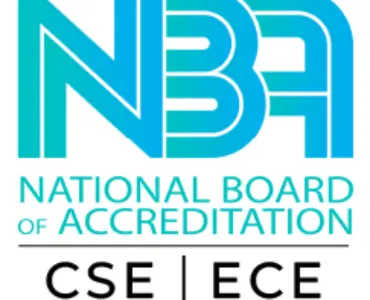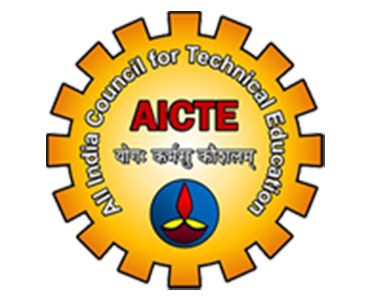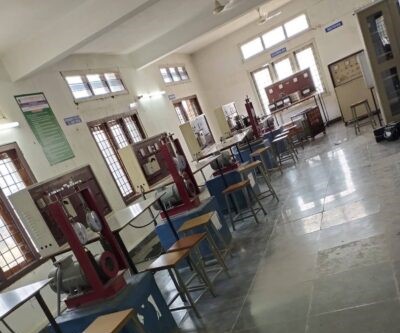
The laboratories in Department of Electrical and Electronics Engineering are intended to give practical experience to the students. Laboratories are useful for students to implement the theory in practical aspects and helps student to apply their knowledge of theory for various courses of their course outcomes.
EEE finds its application both in hardware and software these days. Most of the experiments are conducted using both hardware and software tools. All the laboratories are equipped with software tools which are necessity of today’s industrial requirement.
The department has its own computer laboratory, possessing computers processors, with high speed Internet connection.
The department is having all the following fully equipped laboratories.
B. TECH LABORATORIES
- Basic Electrical Engineering Lab
- Basic Electrical & Electronics Engineering Lab
- Control systems Lab
- Electrical circuits Lab
- Electrical Machines-I Lab
- Electrical Machines II Lab
- Electrical Measurements and Instrumentation Lab
- Electrical & Electronics Design Lab
- Machines Lab I & II
- Measurements & Instrumentation Lab
- Power Electronics Lab
- Power Systems Lab
- Power System & Simulation Lab
BASIC ELECTRICAL ENGINEERING LAB
The aim of the basic electrical engineering lab is to understand the basic of the electrical fundamentals and the network analysis part and to understand the concept of related electrical machines and transformers in practically MCCB, MCB, RCCB, Fluorscent tube and other lamps.

Facilities :
KCL and KVL kits, Superposition, Norton’s theorem kits, Maximum power theorem,Ohms law, Thevenins theorem, and motor and transformer.
CONTROL SYSTEMS LAB
Control system is a major engineering discipline that is extended to various fields like medicine, biology, sociology etc due to the universality of the principle of control system. Realizing the need, the dept has provided a lab for control system.

Facilities :
AC servo motor, Synchros, DC and AC position control kits, Stepper motors, DC servo motors, DC motors

ELECTRICAL CIRCUITS LAB
The Electrical Circuits Laboratory assists the students to impart with essential knowledge of electrical and electronic circuit design and analysis and provide hands on experience to design different electrical and electronic circuits with bread boards and with different active and passive components. This Lab gives the practical learning and use of various instruments like Multimeter, Oscilloscopes, Function Generators, Wattmeter’s etc. Along with this, they do practical verification of various electrical theorems, Tests on Transformer, measurement of power in three phase circuits using wattmeter etc.
Facilities :
Regulated power supply (20 Nos), Cathode ray oscilloscope (20 Nos), Function Generators (15 Nos), MATLAB and LabVIEW Software
ELECTRICAL MACHINES-I LAB
The objective of the DC Machines Laboratory is to impart knowledge about characteristics and behavior of the DC Machines, operation of DC machines and give them experimental skill, familiarize with the constructional details of different types, working principle and their performance. It also provides the essential facilities to the students to augment their concepts about the fundamentals of rotating machines. It is well equipped lab to provide experimental and hands-on experience to the detailed study of characteristic and operational aspects of DC electrical machines.

Facilities :
DC Shunt Motor – Generator Set (02 Nos), DC Shunt Motor – Series Generator Set (02 Nos), DC Shunt Motor – Compound Generator (02 Nos), Identical DC Shunt Machines, Identical DC Series Machines, DC Shunt Motor (02 Nos)

ELECTRICAL MACHINES - II LAB
AC Machines laboratory is designed for students to perform experiments on transformers, Inductions motors and Synchronous machines. The main objective of this laboratory is to impart knowledge about characteristics and behavior of the AC Machines, operation of transformers, synchronous and asynchronous machines and give them experimental skill, familiarize with the constructional details of different types, working principle and their performance. This lab consists of machines and all are mounted in industrial type of assembly to give the students industrial feel.
Facilities :
Single phase transformer (10 Nos), three phase transformer (04 Nos), Induction Motors (05 Nos), three phase synchronous motor (02 Nos), Alternator Sets (04 Nos) and drives (05 Nos)
ELECTRICAL MEASUREMENTS AND INSTRUMENTATION LAB
The importance of measurements is simply eloquently expressed in the following statement of the famous physician Lord Kelvin, “I often say that when you can measure, what you are speaking about and can express it in number, you know something about it; when you cannot express it in numbers your knowledge is of meager and unsatisfactory kind”. The advancement of science and technology is dependent upon a parallel progress in measurements techniques. To keep ourselves updated in modern developments and technologies a practical knowledge of measurements and measurements systems is essential. Our MI lab has been catering the above mentioned service to the students.
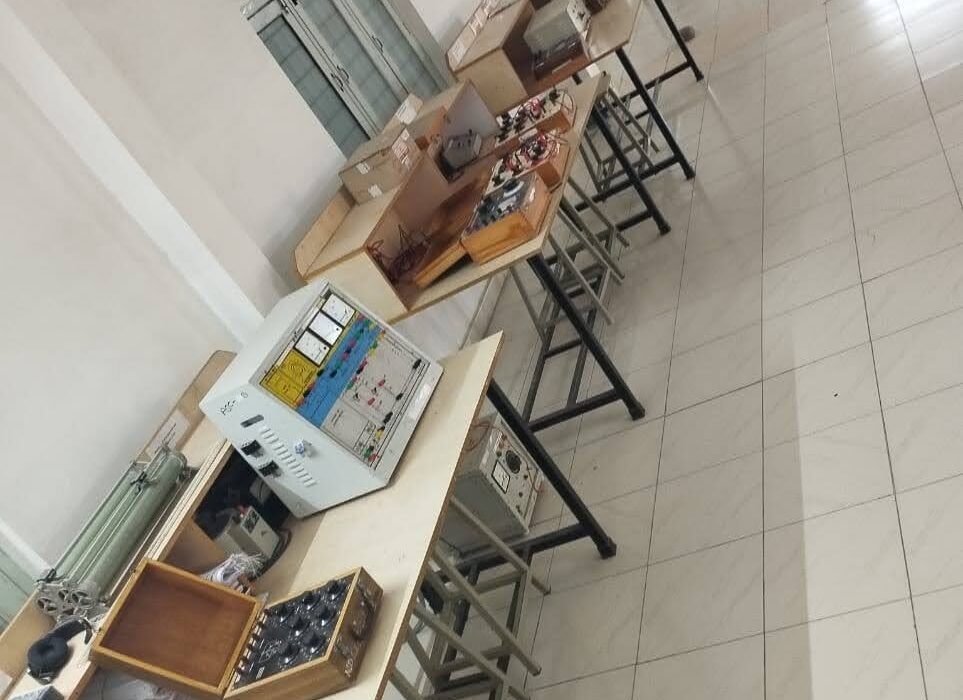
Facilities :
Transformer oil testing set up, Single Phase Energy Meter (02 Nos), DC Potentiometer, Kelvin’s Double Bridge, Schering and Anderson’s Bridge, Current Transformers (06 Nos), Strain Guage Kit, LVDT Kit, Dynamometer power factor meter, Thermostat, Resistance Temperature Detector, Thermocouple, Thermistor, Bidirectional energy meter, Encoders, Speed, Pressure and distance measurement set ups, watt meters.
MACHINES LAB I & II
The main aim of this lab is to provide a deep exposition of the working of electomechanical devices, with specific emphasis on the working of rotating electrical machines and transformers. It is also used for research and development work by various branches under electrical category.
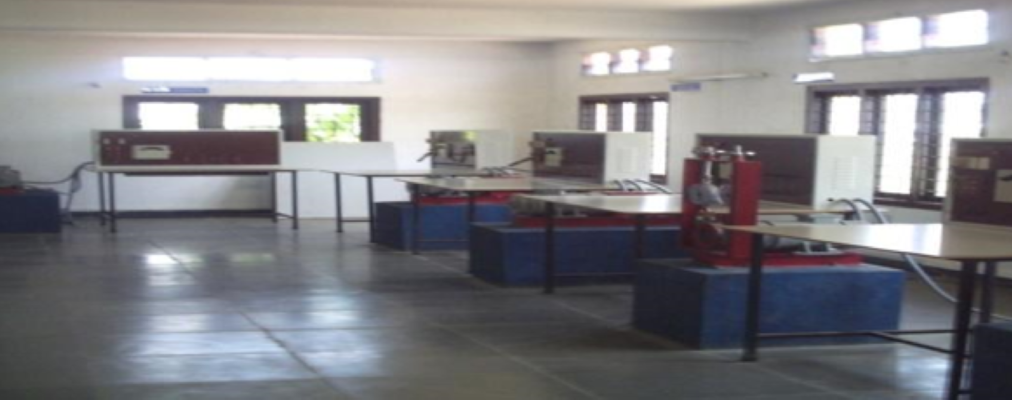
Facilities :
DC Shunt motor, DC Series motor, DC Compound motor, DC Shunt generator, DC Series generator, DC Series compound generator, Single phase Squirrel cage induction motor, Three phase Squirrel cage induction motor, Single phase transformers, Three phase transformers, Slip ring Induction motor, Alternator, Synchronous motor
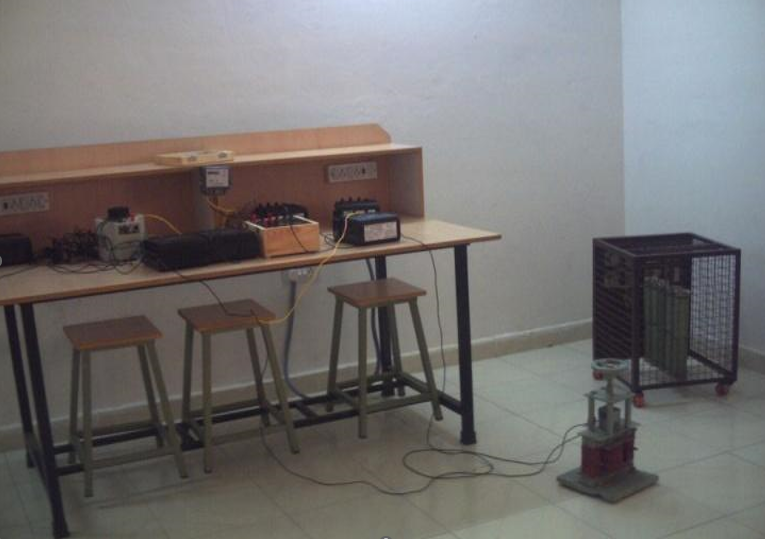
MEASUREMENTS & INSTRUMENTATION LAB
The importance of measurements is simply eloquently expressed in the following statement of the famous physician Lord Kelvin, “I often say that when you can measure, what you are speaking about and can express it in number, you know something about it; when you cannot express it in numbers your knowledge is of meager and unsatisfactory kind”. The advancement of science and technology is dependent upon a parallel progress in measurements techniques. To keep ourselves updated in modern developments and technologies a practical knowledge of measurements and measurements systems is essential. Our MI lab has been catering the above mentioned service to the students.
Facilities :
Wheatstone bridge, Anderson bridge, Kelvin’s double bridge, scherings bridge, desauty bridge kits, CRO’S regulated power supply, Strain gauge, pressure gauge kits, LVTD lits, Energy meters to measure power etc.
POWER ELECTRONICS LAB
This laboratory throws light on the techniques of designing and building power electronic circuits. Our lab is fully equipped with advanced power electronic circuits and modules like three phase IGBT based inverter, MOSFET choppers, DC-DC converter etc. This lab requires a special non conventional teaching approach. It is mainly used to conduct experiments in the domain of digital electronics. Major equipments in the PE lab are

Facilities :
Series and parallel inverter, IGBT based chopper modules, voltage communication choppers, R,RC,UJT firing modes, SCR, TRIAC, MOSFET modules, Single phase and three phase PWM inverter modules, Single phase cyclo converters
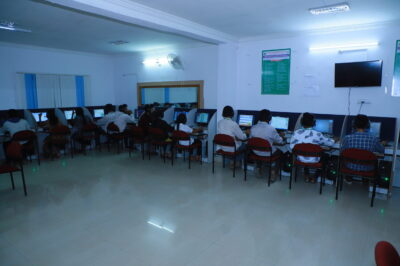
POWER SYSTEMS & SIMULATION LAB
Acquire Skills of using Computer Packages, MATLAB Coding, PSPICE, LabVIEW, VISIO and MULTISIM in Power Electronics and Control System courses.
Facilities :
MATLAB, LabVIEW, PSPICE, Power System Computer Aided Design (PSCAD) packages

